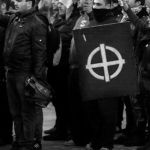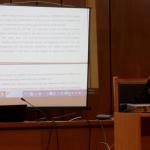ATHENS – “Systematically avoid the term national-socialism, for obvious reasons.”
That emphatic directive appeared in a document circulated in the nationwide offices of Greece’s neo-Nazi Golden Dawn party right before the Greek police unleashed an unprecedented crackdown against them in September 2013. Intended as an “eyes only” instruction for trusted party officers, it was meant to regulate the language used in initiating new members, and interacting with the public and media.
But the diktat also amounted to an implicit admission of the party’s core ideology, despite a recent public relations campaign to blur the most toxic elements of its neo-fascist ideology, once so integral to the party’s identity in its formative years in the early 1980s.
The document, first published in the Greek daily ‘Efimerida ton Syntakton’, is just one indication of the party’s latest orchestrated efforts to hide its roots in Nazi ideology, its admiration for Hitler and the ideals of nationalist supremacy, and transform itself from an immigrant-bashing fringe on the margins of Greek political life into a mainstream political force.
The party instruction manual is now part of the treasure trove of documents, photos and videos that public prosecutors have unearthed in their ongoing investigation into the party — an inquiry that has unveiled startling facts about its true aims and practices.
Golden Dawn has seen its once rapid rise on the European political scene grind to a dramatic halt in the wake of an investigative crackdown following the murder of the anti-fascist rapper Pavlos Fyssas by a party member in Nikaia in September 2013.
While in the run up to the 2014 European elections, the party was projected to take home more than 10 percent of the vote, the party actually lost voters (in absolute numbers) compared to its performance in 2012, when it first managed to enter the Greek parliament with 18 MPs. With most of its sitting MPs now in prison or awaiting trial, the party’s presence in the parliament is minimal.
Almost 70 members — including the party’s leader, Nikos Michaloliakos, various deputies and various local officers — are to be put on trial, charged with forming a criminal organization. The charges include murder, aggravated assault, and possession of guns and explosives, among other offenses.
While racist attacks by Golden Dawn supporters continue on the streets of Greece, the parliamentary side of the party seems to be finished, with Michaloliakos keeping a low profile after his release from jail after 18 months of pre-trial detention, and while he is still under house arrest.
With the trial of party leaders pending, it’s worth revisiting the scene where Golden Dawn’s downfall began, along with the conditions that enabled this formerly fringe group to become an existential threat for Greek democracy.
Demise
Nikaia is a working class area in the port city of Piraeus, in greater Athens. Traditionally associated with shipbuilding, the area has unwillingly become the focal point of Golden Dawn’s demise.
Here, in P.Tsaldari street where Pavlos Fyssas drew his last breath, a statue of the 34-year-old singer has been erected in his memory. Golden Dawn member Giorgos Roupakias was charged with his murder.
The memorial statue is routinely defaced with swastikas, only to be restored shortly afterward by local residents. Nikaia and the nearby area of Perama, are among the places where austerity and the failures of the Greek political class have hit home hardest. It’s also here that Golden Dawn thought it would find fertile ground.
The nearby shipping docks have been in decline for years but the Communist-dominated metal-workers union has been fervently resisting the efforts of employers to demand concessions and flexible working conditions.
Golden Dawn became an instrument in this fight in 2012. As the union itself reported to the public prosecutor in Piraeus, the party attempted to create an alternative union, dominated by party regulars, that would work in co-operation with the employers and “throw the Communists in the sea”, as the party’s deputy Giannis Lagos said during a visit in August 2013.
Golden Dawn’s help did not come cheap: the civic prosecution has publicly stated businessmen active in the shipping yards donated €400,000 in exchange for their support.
According to the metal-workers union’s president Sotiris Poulikogiannis, the conflict resulted in an attack against him and a team of his comrades in early September 2013, and ultimately in the death of Pavlos Fyssas a few days later. Golden Dawn insisted on being seen as running the show in Nikaia, and Fyssas was its final victim.
The labor dispute in Perama was not an isolated case. Acting essentially as a clearinghouse for renting muscle, Golden Dawn applied the same business model across the country. Its activities included infiltrating security firms that were used to intimidate immigrant workers, “rent-a-mobs” used for the same purpose by businessmen, or to intimidate employers to hire Greek workers instead of foreigners for lower wages. The high unemployment (still standing at more than 25 percent) brought on by EU-imposed austerity measures after 2010, allowed such practices to flourish.
“These hands might salute like this sometimes, but they are clean hands, not dirty,” party leader Michaloliakos said as he waved the stiff-armed Nazi heil in a 2014 speech to his followers.”They haven’t stolen.” But evidence suggests that the party has used any means available to expand and finance its operations.
In the shadows, the party operated a mafia-style operation, even running protection rings in areas like Athens’ Agios Panteleimonas, another stronghold for the party. At the same time, its political aspirations grew larger.
In private conversations between GD members heard in intercepted calls and seen in text messages contained in confiscated mobile phones, officers are heard saying “we are at 40 percent [of the vote], we’re going to be in government” or “we’ll take the parliament with tanks”, phrases indicative of the narrative prevalent inside the party.
Photographic and video evidence of military training carried out in rural areas with knives and weapons, confirms both the party’s aspirations and its strict paramilitary structure.
Party activists and members also appear to have been amassing an arsenal: In just26 cases, police investigations turned up 19 pistols, 30 rifles and shotguns, more than 2,000 shells, 27 BB guns, 69 weapons of various types, 31 police batons, 12 canisters of pepper spray and more.
In a video leaked to the Greek press, party deputy Illias Kasidiaris, who once slapped a female MP on live TV, is seen organizing a “storm detachment,” with supporters wearing helmets and holding shields.
Despite its efforts to appear as a legitimate democratic choice, the party’s strict top-down organization — following the rule of the Führer-Prinzip — and its affinity for violence, actually reveal a much more violent vision.
Phenomenon
But Golden Dawn isn’t an isolated phenomenon. The prosecutor’s investigation into the party has exposed its ties to the police, the armed forces and even politicians from other parties. The collusion of diverse parts of the Greek establishment was necessary for its success.
In the European elections of 2014, this became obvious, when the party’s candidates were a degree removed from its Greek parliamentary team. Ex-army and police officers, academics and other so-called respectable faces made the party’s ambitions clear: to become a serious contender for a position in a future coalition government.
Some elements inside the ruling New Democracy (ND) party had hinted that this was a desirable outcome, since they viewed Golden Dawn as the party’s natural extension. One of those politicians was the party’s now ex-secretary Takis Baltakos, who was revealed to be in communication with GD deputy Illias Kasidiaris, acting as an intermediary between ND and GD, synchronizing the two parties’ positions on various votes.
Despite his removal from office, Baltakos is still a member of New Democracy. Many analysts think that helps explain why the then-government didn’t move against the party sooner, despite the numerous attacks, including some deadly ones, on immigrants.
Following the murder of Pavlos Fyssas, it was revealed that Nikos Dendias, the then-minister of citizen protection, had been sitting on several case files against Golden Dawn, but only moved when the murder of a Greek national forced his hand.
On the eve of the first trial — set to start on May 5 (after it was postponed last week) and projected to last more than 18 months — and with Syriza, a staunchly anti-fascist party, now in power, the dynamics that allowed Golden Dawn to succeed electorally seem to have weakened significantly.
But the conditions brought on by austerity that allowed them to do so in the first place, are still present.
It will take not just an improvement of the country’s fortunes on the financial front, but also the complete overhaul of institutions like the Greek police to avoid the re-emergence of the party in the future.
Yiannis Baboulias is a journalist based between London and Athens. His work has been featured in Al Jazeera English & America, Ch4 News, Vice, the LRB and Newsweekamong others. He is the writer of a book on the Golden Dawn, to be published later this year by ZED Books in the UK.









